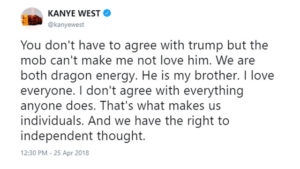A hot topic of discussion this week was Kayne West. It seems as if Kayne or other members of his family are always infiltrating our lives, but this news was bigger than most. Kayne sparked some controversy when he publicly announced his support for President Trump on Twitter. Many people had a hay-day, calling him out for his support, while others supported him for sharing his opinion regardless of its unpopularity.
His tweets and the following responses got me thinking about unpopular opinions. We all have them. For instance, I don’t like Mac n Cheese. You may not like Beyoncé, which is just wrong, but that’s beside the point. Everyone likes or dislikes something that is in opposition to the norm.
I want to clarify something about my definition of the word ‘unpopular’. The word is defined as “not liked or popular”. There are two sides to this definition. One side speaks to the majority opinion or whether something is liked or not liked by the majority. The ‘popular’ part is interesting because something that is popular may not be liked by the majority.
There is a common phenomenon called the “spiral of silence”, where people who hold unpopular opinions are a lot less likely to share these opinions because they fear social isolation. It makes sense; why would anyone want to share their feelings and then get hated on for them?
In a world where everyone is sharing everything at all times, it’s hard to conceal these opinions. Often when they are brought up, we find ourselves lying to others or staying quiet, but this isn’t always beneficial. While it may be okay to keep your opinions on Trump’s tax plan to yourself and save everyone from a heated argument, it may be helpful to share your feelings on a team decision even if it contradicts everyone else.
Although the concealing of unpopular opinions is done in all groups and at all ages, it is especially found amongst young people. Adolescents are inherently more insecure because duh and thus, they are much more unlikely to speak up and share their not popular feelings.
This serves as a love letter to my generation and a warning to my elders. To my fellow Gen-Zer’s, don’t be afraid to speak up and don’t be afraid to disagree with everyone else! To the millennials and Gen-Xer’s and whoever else is reading this, be on the lookout for your agreeing Gen-Z employees. Encourage them to speak their opinion in a comfortable scenario. And try to be sympathetic if you find them agreeing with the majority because we were all self-conscious young people once.
Also, I’d like to point out that I learned about the “spiral of silence” in one of my classes this semester and I’m out here applying it to real-world scenarios! (@my professors and @my parents).
 This post was written by Cameron Sackett (not Tim) – you can probably tell because it lacks grammatical errors!
This post was written by Cameron Sackett (not Tim) – you can probably tell because it lacks grammatical errors!
HR and TA Pros – have a question you would like to ask directly to a GenZ? Ask us in the comments and I’ll respond in an upcoming blog post right here on the project. Have some feedback for me? Again, please share in the comments and/or connect with me on LinkedIn.

The “Greatest Generation” is also known as the “Silent Generation”. Yes they have done amazing things – but they were not typically apt to rock the boat, question authority, etc. So you actually reinforce Tim’s argument – it was the Baby Boomers, coming after them in more affluent times, who began to be more openly questioning of authority.
I’m with Tim that this generation may need more encouragement – we certainly need to encourage all our employees to speak up, teach them how to do it respectfully & appropriately, and it’s on us to create the “safe” environment for that to happen.
We have an “emerging professionals” group at our company that has been very helpful – to give them tools/resources as they start their careers but also for us to tap into their enthusiasm and creativity. Lots of good stuff happening, very happy to have multiple generations and perspectives to work with, makes us all richer for it.
Keep up the great posts Cameron!
Cameron, I’ve got to give you a “Nope” on this one. Everyone has choices to make, and to sit on an opinion or idea out of some internal fear is on the person witholding it. We all have to take accountability for ourselves, and not abdicate that to someone else. Gen Z, like every generation before it will have to learn that if you believe in something, you have to stand up for it, and realize that no one is going to take away your birthday for your opinions. Greatness has never feared honesty.
Jimmy,
I think you miss one core Generational impact that comes into play here. Gen Z was raised during the great recession. They saw parents lose jobs, they saw friends lose their house, they saw us at our worst. We can then imagine that when they come into the work environment they’ll be less willing to initially stick their neck out.
I hear you on the courage aspect, but first, their needs to be some trust deposits with this Gen!
T
Tim, so my question then is: How are they different than “the greatest generation”? They grew up in the depression, and went on to fight and win a world war, and come home and build a strong America.